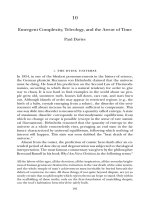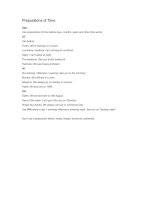my first book of time my first book
Bạn đang xem bản rút gọn của tài liệu. Xem và tải ngay bản đầy đủ của tài liệu tại đây (14.66 MB, 15 trang )
Book of Time
Discover more at
www.dk.com
12
11
1
2
3
5
6
7
8
Book of Time
12
1
2
3
10
11
8
7
6
5
10
Book of Time
$12.99 USA
$15.99 Canada
Hands-on learning with
a special fold-out clock
L
Have fun practicing where all the
clock numbers go
L
Move the hands to show o’clock times
L
See if you can find lots of clocks
on every page!
An interactive book with notes for parents.
“Ideal for young children getting to grips with
their first experience of telling the time.”
Geraldine Taylor – Education Consultant
I S B N 978-0-7566-2938-0
9 7 8 0 7 5 6 6 2 9 3 8 0
5 1 2 9 9
Printed in China by Leo Paper Products
Please remove plastic
wrapper before giving
this book to your child.
Contains small parts.
Recommended for children
over 36 months of age.
Introduction You can help your child learn about time and how we measure it from
his or her early years. Babies and toddlers quickly anticipate the landmarks in their days—
getting up, going out, lunchtime—and later, they’ll understand the idea of day and night.
The earliest step for telling the time is an interest in the clocks around us, and when children show
this, we can focus on the idea of the hour o’ clock—a contraction of ‘the hour of the clock’—in
relation to the big events of a day, e.g. mealtimes, playing times, bath times, and bedtimes!
This book aims to introduce this o’ clock principle with the aid of a chunky foam clock with
removable numbers. This will help your child learn which numbers go where in a fun, hands-on
way, and prove a great introduction to the hour times mentioned throughout the book. The
book shows real and imaginary clocks and watches, focuses on different times of the day,
and encourages the idea of ‘fast’ and ‘slow’ with toys.
Find a clock or two! Clocks are everywhere:
at home; in the car; in stores; and all around.
Set fun challenges like “Let’s see if we can find
four clocks today.” Explain that digital displays
are clocks, too, and that they’ll learn these later.
Time talk: When you talk about your day, try
to include key words, e.g. morning, afternoon,
evening, and night. “What have we done
this morning?” “What should we play this
afternoon?” “Soon it will be time for your bath
tonight.” “It’s going to be a starry night.”
Special hours: Add hours to special events.
“We’re going out at 10 o’ clock this morning.”
“Our friends are coming at 3 o’ clock this
afternoon.” “It’ll be dark at 7 o’ clock tonight.”
Make a night picture: Use dark paper, and
add a silver moon and shiny stars! Talk about
how most people sleep during the night but
owls, bats, and foxes sleep during the day
and are active at night!
Whose watch? Show your child your own
watch. Explain how the straps allow you
to take the little clock around with you.
Encourage your child to ask family or friends
if they are wearing a watch. Why not design
and make a paper watch for teddy together?
When you buy your child a first watch, choose
a traditional watch face. Digital can come later
when the idea of time is better grasped.
Just a minute! Introduce the idea of minutes
and the length of time by using an egg timer,
a stopwatch, the second hand on a watch or
clock, or a cooking timer. Try playing these
simple games. Children love putting on a timer
and waiting for it to beep! Children can time
you, e.g. “How long does it take Mommy to put
on her shoes and coat?” You can also set a time
challenge, e.g. “Let’s see if you can put on your
pajamas and jump into bed in just one minute?”
or “Can you sing for a whole minute?” or
even “Can you be very quiet and still for
two minutes?!”
Time activities to do at home
Notes for parents
My First Book of Time
12
10
11
8
6
3
1
2
4
7
5
9
T
h
e
h
a
n
d
s
g
o
t
h
i
s
w
a
y
a
r
o
u
n
d
t
h
e
c
l
o
c
k
.
T
h
i
s
i
s
c
a
l
l
e
d
a
c
l
o
c
k
w
i
s
e
d
i
r
e
c
t
i
o
n
.
Long hand
The long, red
hand is the
minute hand.
Short hand
The short, green
hand is the
hour hand.
Written by Anna Harrison
Designed by Mark Richards
Jacket designed by Victoria Harvey
U.S. Editor: Jennifer Quasha
Production Controller: Lloyd Robertson
Special Photography: Dave King
Educational Consultant: Geraldine Taylor
With thanks to: Gary Kings for model making,
and Lynne Moulding for illustration
Picture Credits: The publisher would like
to thank the following for their kind
permission to reproduce their photographs:
Robot p 4 Courtesy of John Rigg,
The Robot Hut, Door p 8 Stephen Oliver
All other images © Dorling Kindersley.
For further information
see www.dkimages.com
Published in the United States
by DK Publishing, Inc.
375 Hudson Street, New York,
New York 10014
© 2007 Dorling Kindersley Limited
All rights reserved.
07 08 09 10 11 10 9 8 7 6 5 4 3 2 1
Printed in China by Leo Paper Group
LONDON, NEW YORK, MUNICH,
MELBOURNE, and DELHI
11
Amazing clocks
Look for clocks when you are
walking around. All these clocks
show the start of the hour.
Where clock
numbers go
•
Start by putting the 12 at
the top and the 6 at the bottom.
•
Next put in 9 on the left side
and 3 on the right side.
•
Add all the other
numbers!
Take out all the numbers
from your foam clock.
Now can you put them
back in the right order?
12
2
4
7
5
9
6
1
8
10
3
11
Do you wear a watch? Each of these toys
has a watch! Can you see which watch
belongs to which toy?
Wonderful watches!
duck robot
doll
teddy
3 o’ clock
It’s 3 o’ clock!
Make it
3 o’ clock
on your
foam clock.
10 o’ clock
It’s 10 o’ clock!
Let’s turn the
hands on your
foam clock to
make 10 o’ clock.
5 o’ clock
It’s 5 o’ clock.
Make it
5 o’ clock
on your
foam clock.
8 o’ clock
It’s 8 o’ clock.
Let’s turn the
hands on your
foam clock to
make 8 o’ clock.
O’ clock
Turn the long
hand to 12.
Turn the short hand
to what hour
o’ clock it is.
12
39
6
11
10 2
1
4
8
7 5
12
39
6
11
10 2
1
4
8
7 5
12
39
6
11
2
1
4
8
7 5
10
12
39
6
11
10 2
1
4
8
7 5
Day and night
A clock tells us what time it is during
the day and the night. Each day has a
morning, afternoon, and evening.
•
What is
your favorite
time of day?
Afternoon
What time
does this
clock tell?
Morning
When do you eat
your breakfast?
CRUNCHY
FLAKES
Evening
What time do you take a bath?
Nighttime
What time do you go to bed?
Happy hours!
One hour after 2 o’ clock is 3 o’ clock!
Some things take just one hour to do!
What are these children doing?
Jack and his puppy
are off to the park.
What time do
they leave?
What time
do they get
back home?
What time
does Jamilla
start painting?
T
i
m
e
f
o
r
a
w
a
l
k
!
T
i
m
e
f
o
r
p
a
i
n
t
i
n
g
!
12
1
2
3
9
10
11
8
7
6
5
4
12
1
2
3
9
10
11
8
7
6
5
4
12
1
2
39
10
11
8
7
6
5
4
Puppy
FOOD
Jen is baking some bread.
What time does she put
the bread into the oven?
What time does
the bread come
out of the oven?
What time
does Jamilla
finish painting?
T
i
m
e
f
o
r
c
o
o
k
i
n
g
!
T
i
m
e
f
o
r
p
a
i
n
t
i
n
g
!
12
1
2
3
9
10
11
8
7
6
5
4
12
1
2
3
9
10
11
8
7
6
5
4
12
1
2
3
9
10
11
8
7
6
5
4
Time to play
Whoosh! Some things travel very
fast. Which toy do you think
travels the fastest?
race
car
•
Which
vehicles move
more slowly?
•
What time
does the train
leave the
station?
•
Can you
count all the
clocks?
train
STATION
12
6
9
2
1
3
4
5
8
7
10
11
bike
truck
motorcycle
air plane
tractor
•
What
time does the
air plane arrive
at the airport?
bus
T
OWN
H
ALL
12
6
9
2
1
3
4
5
8
7
10
11
12
6
9
2
1
3
4
5
8
7
10
11
AIRPORT
12
6
9
2
1
3
4
5
8
7
1
0
11
Book of Time
Discover more at
www.dk.com
12
11
1
2
3
5
6
7
8
Book of Time
12
1
2
3
10
11
8
7
6
5
10
Book of Time
$12.99 USA
$15.99 Canada
Hands-on learning with
a special fold-out clock
L
Have fun practicing where all the
clock numbers go
L
Move the hands to show o’clock times
L
See if you can find lots of clocks
on every page!
An interactive book with notes for parents.
“Ideal for young children getting to grips with
their first experience of telling the time.”
Geraldine Taylor – Education Consultant
I S B N 978-0-7566-2938-0
9 7 8 0 7 5 6 6 2 9 3 8 0
5 1 2 9 9
Printed in China by Leo Paper Products
Please remove plastic
wrapper before giving
this book to your child.
Contains small parts.
Recommended for children
over 36 months of age.
Introduction You can help your child learn about time and how we measure it from
his or her early years. Babies and toddlers quickly anticipate the landmarks in their days—
getting up, going out, lunchtime—and later, they’ll understand the idea of day and night.
The earliest step for telling the time is an interest in the clocks around us, and when children show
this, we can focus on the idea of the hour o’ clock—a contraction of ‘the hour of the clock’—in
relation to the big events of a day, e.g. mealtimes, playing times, bath times, and bedtimes!
This book aims to introduce this o’ clock principle with the aid of a chunky foam clock with
removable numbers. This will help your child learn which numbers go where in a fun, hands-on
way, and prove a great introduction to the hour times mentioned throughout the book. The
book shows real and imaginary clocks and watches, focuses on different times of the day,
and encourages the idea of ‘fast’ and ‘slow’ with toys.
Find a clock or two! Clocks are everywhere:
at home; in the car; in stores; and all around.
Set fun challenges like “Let’s see if we can find
four clocks today.” Explain that digital displays
are clocks, too, and that they’ll learn these later.
Time talk: When you talk about your day, try
to include key words, e.g. morning, afternoon,
evening, and night. “What have we done
this morning?” “What should we play this
afternoon?” “Soon it will be time for your bath
tonight.” “It’s going to be a starry night.”
Special hours: Add hours to special events.
“We’re going out at 10 o’ clock this morning.”
“Our friends are coming at 3 o’ clock this
afternoon.” “It’ll be dark at 7 o’ clock tonight.”
Make a night picture: Use dark paper, and
add a silver moon and shiny stars! Talk about
how most people sleep during the night but
owls, bats, and foxes sleep during the day
and are active at night!
Whose watch? Show your child your own
watch. Explain how the straps allow you
to take the little clock around with you.
Encourage your child to ask family or friends
if they are wearing a watch. Why not design
and make a paper watch for teddy together?
When you buy your child a first watch, choose
a traditional watch face. Digital can come later
when the idea of time is better grasped.
Just a minute! Introduce the idea of minutes
and the length of time by using an egg timer,
a stopwatch, the second hand on a watch or
clock, or a cooking timer. Try playing these
simple games. Children love putting on a timer
and waiting for it to beep! Children can time
you, e.g. “How long does it take Mommy to put
on her shoes and coat?” You can also set a time
challenge, e.g. “Let’s see if you can put on your
pajamas and jump into bed in just one minute?”
or “Can you sing for a whole minute?” or
even “Can you be very quiet and still for
two minutes?!”
Time activities to do at home
Notes for parents









